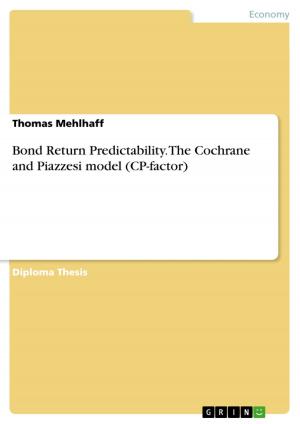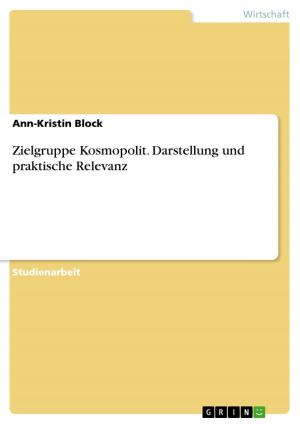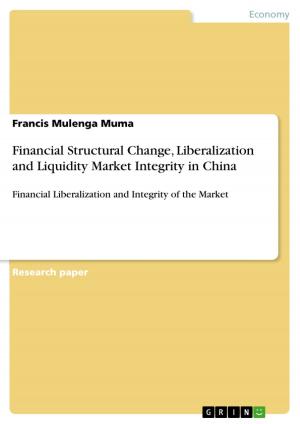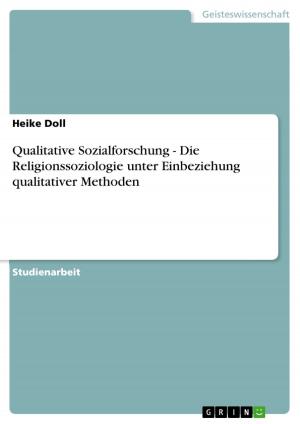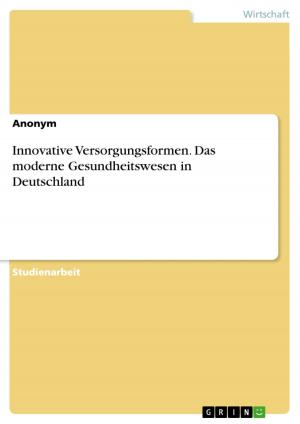The EU and China
The impact of EU policy on the human rights situation in the People's Republic of China
| Author: | Jens Hillebrand | ISBN: | 9783640169535 |
| Publisher: | GRIN Verlag | Publication: | September 19, 2008 |
| Imprint: | GRIN Verlag | Language: | English |
| Author: | Jens Hillebrand |
| ISBN: | 9783640169535 |
| Publisher: | GRIN Verlag |
| Publication: | September 19, 2008 |
| Imprint: | GRIN Verlag |
| Language: | English |
Seminar paper from the year 2008 in the subject Politics - International Politics - Topic: Public International Law and Human Rights, grade: 1,7, Vrije University Brussel (Faculty of Economic, Political and Social Sciences and Solvay Business School), course: European and International Politics, 73 entries in the bibliography, language: English, abstract: This paper examines the impact of policies of the European Union (EU) on the human rights development in the People's Republic of China (PRC). To this end the definition of human rights from a United Nations perspective will be used. After briefly looking at the history of human rights abuses in China, the paper turns towards the main analysis shedding light on the EU's conditional engagement policy towards China and the nature of the EU-China relations - whether it be a true strategic partnership or merely a strategic dialogue. The paper then evaluates the success of the EU's policy by looking at how far it has been able to achieve its objectives set with regard to human rights in the PRC. Moving on from the achievements to date, a critical outlook on the prospects of Europe's strategy is given comprising an analysis of the opportunities and challenges the EU is likely to face in this respect. Finally, the paper concludes that the impact of the European Union on the human rights development in China remains far from clear-cut. Whereas some scholars and politicians attribute much of the observed advancements to Europe's conditional engagement policy, others challenge this view and contest that developments in this area are predominantly related to China's overall economic progress. While the truth probably lies somewhere in between these two opposing views, future human rights development in the PRC will nevertheless remain a challenging task. Whereas developments on the economic and social side are also in China's interest and will thus be relatively easy to promote, holistic progress - including civil and political rights - will only be possible if substantial differences between the EU and China can successfully be dissolved. Amongst other things, this will require the development of deep mutual cultural understanding and the discovery of sophisticated, novel negotiation approaches. Due to the complexity and sensitivity of the involved issues meaningful progress will only develop gradually, though, and the achievement of a universally acceptable human rights standard in China will still require a substantial amount of time as well as the willingness to compromise on behalf of both parties.
Seminar paper from the year 2008 in the subject Politics - International Politics - Topic: Public International Law and Human Rights, grade: 1,7, Vrije University Brussel (Faculty of Economic, Political and Social Sciences and Solvay Business School), course: European and International Politics, 73 entries in the bibliography, language: English, abstract: This paper examines the impact of policies of the European Union (EU) on the human rights development in the People's Republic of China (PRC). To this end the definition of human rights from a United Nations perspective will be used. After briefly looking at the history of human rights abuses in China, the paper turns towards the main analysis shedding light on the EU's conditional engagement policy towards China and the nature of the EU-China relations - whether it be a true strategic partnership or merely a strategic dialogue. The paper then evaluates the success of the EU's policy by looking at how far it has been able to achieve its objectives set with regard to human rights in the PRC. Moving on from the achievements to date, a critical outlook on the prospects of Europe's strategy is given comprising an analysis of the opportunities and challenges the EU is likely to face in this respect. Finally, the paper concludes that the impact of the European Union on the human rights development in China remains far from clear-cut. Whereas some scholars and politicians attribute much of the observed advancements to Europe's conditional engagement policy, others challenge this view and contest that developments in this area are predominantly related to China's overall economic progress. While the truth probably lies somewhere in between these two opposing views, future human rights development in the PRC will nevertheless remain a challenging task. Whereas developments on the economic and social side are also in China's interest and will thus be relatively easy to promote, holistic progress - including civil and political rights - will only be possible if substantial differences between the EU and China can successfully be dissolved. Amongst other things, this will require the development of deep mutual cultural understanding and the discovery of sophisticated, novel negotiation approaches. Due to the complexity and sensitivity of the involved issues meaningful progress will only develop gradually, though, and the achievement of a universally acceptable human rights standard in China will still require a substantial amount of time as well as the willingness to compromise on behalf of both parties.

